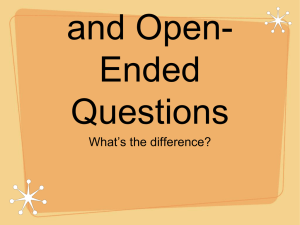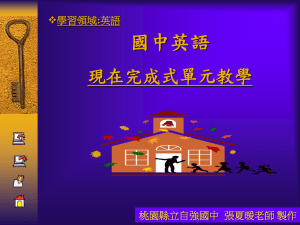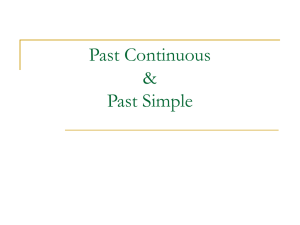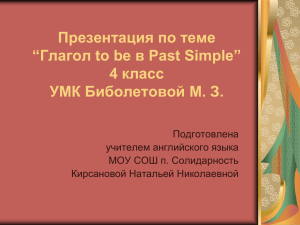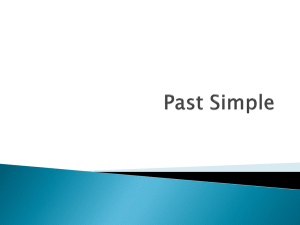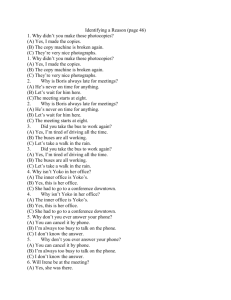高三英语-unit3 Grammer
advertisement
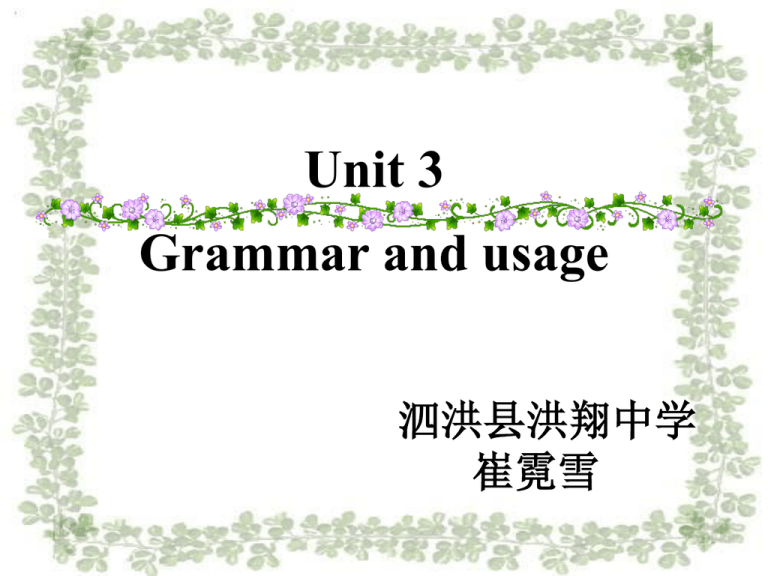
Unit 3 Grammar and usage 泗洪县洪翔中学 崔霓雪 Non-restrictive attributive clauses 非限制性定语从句 Words preview skinny lift consider effect affect sportsman adj. 极瘦的,皮包骨的 vt. 举起 vt. 考虑 n. 效果,作用;影响 vt. 影响 n. 运动员 Words and Expressions preview achievement risk post side effect fall out n. 成就 n. & vt. 冒险 n. (在网上发布的)帖子 副作用 (头发等)脱落 Who is he? *The man ________ who/that is sitting there is Brad Pitt. who/whom *The man __________ /that/- she speaks to is _______ Brad Pitt. whom she *The man to _______ speaks is Brad Pitt. Who is she? who took Cecilia, ______ weight-loss pills, now realizes that health is important. whose Cecilia, _______ body is thin, still wants to lose some weight (减肥). 限制性定语从句与先行词之间不用逗号 隔开; 非限制性定语从句与先行词之间一般用 逗号隔开。 My cousin whose father is a teacher wants to be an actor. My cousin , whose father is a teacher , wants to be an actor. 1. A. This is the place where I lived ten years ago. B. She is going to spend the winter holiday in Macao, which returned to China in 1999. 2. A. He is a man who I can ask for help. B. His father, who works in Beijing, came back yesterday. 限制性定语从句和先行词关系密切,如果去掉 从句,剩余部分意义不完整;非限制性定语从 句只是先行词的附加说明,如果去掉从句,意 义仍然完整。 S=subject, P=predicate, O=object, My house , which I bought last year, has got a lovely garden. 我去年买的的那幢房子带着个漂亮的 花园。 Main clause My house has got a lovely garden. S P O 有时同一个限制性从句变为非限制性从句 会改变全句的意思。 1. I have a sister who works in a hospital. 我有一位在医院工作的姐姐。 (不只一位姐姐) 2. I have a sister, who works in a hospital. 我有一位姐姐,她在医院工作。 (只有一位姐姐) 3. All the magazines here which have beautiful pictures in them were written by him. 里面有漂亮图画的那些杂志是他写的。 (杂志有带图画和不带图画两类) 4. All the magazines here, which have beautiful pictures in them, were written by him. 所有的杂志都是他写的,里面都有漂亮的 图画。 (杂志只有一种) His father, who works in Beijing, came back yesterday. 当先行词是地名人名、世界上独一 无二的事物或家庭唯一成员时,通 常只用非限制性定语从句。 Shanghai, which is in East China, is developing rapidly. Practice Fill in the blanks with proper relative words. 1. The famous basketball star, ____ who is an American, came to China yesterday. 2. In those days, she used to go to Mr black,with whom _____ she had a wonderful time. 3. I bought a car yesterday, _____ cost me a lot. which 4. Xi’an,which ______ I visited last year, is a nice old city. 5. He will come to see me next July, _____ when he won’t be so busy. 6. The school, where _____ I once studied, was built thirty years ago. 7. John said he’d been working in the office for an hour, ________ which was true. As we all know, he is good at 8. ____ English. 非限制性定语从句考点归纳: I. as 和which引导非限制性定语从句, 代 替整个主句。 Examples: 1. As everyone knows, China is a country with a long history. 众所周知,中国是一个历史悠久的国 家。 2. She is a teacher, as is clear from her manner. 她是个教师, 这一点从她的举止可以清 楚地看出。 3. He missed the show, which was really a great pity. 他 错过了演出,这真是很大的遗憾。 4. He invited me to dinner, which made me very happy. 他请我吃饭,这使我很高兴。 Conclusion 1. as 和which在引导非限制性定语从句 时, as和which可代替整个主句,相当 于and this或and that。这两个关系代 词都可指代主句所表达的整个意思,且 在定语从句中都可以作主语和宾语。 2. as和which引导非限制性定语从句的不 同之处在于: (1) as 引导的定语从句可置于句首,而 which引导的定语从句不可放在句首。 (2) as 代表前面的整个主句并在从句中作 主语时,从句中的谓语必须是系动词;若 从句中的谓语为行为动词,则从句中 的关系代词只能用which。另外,as引导 非限制性从句,常带有“正如”的意思。 Practice 1. Alice received an invitation from her boss, which _____ came as a surprise. 2. The weather turned out to be very good, _____ was more than we could expect. which 3. ___ As is expected, the England team won the football match. 4. It rained hard yesterday, _______ which prevented me from going to the park. 5. As __ we can see, the smoke came from the little dustbin. By serving others, a person focuses on someone other than himself or herself, ___ can be very eye-opening and rewarding. (2007湖南) A. who B. which C. what D. that Helen was much kinder to her youngest son than to the others, _____, of course, made the others envy (嫉妒) him. (2004天津) A. who B. that C. what D. which Carol said the work would be done by October, __________ personally (就我个人而论) I doubt (怀疑) very much. (1999 全国) A. it B. that C. when D. which 非限制性定语从句中通常使用 下列关系代词和副词 关系代词:which / who / whom / whose / as 关系副词:when / where (非限制性定语从句中不用关系 词that;非限制性定语从句中关 系词不能省略) II. all / some+ of + whom / which引导非 限制性定语从句 Examples: 1. He has told us many stories, all of which are about the famous Long Match. 2. The students of Class 1, some of whom came from Japan, went camping yesterday. Conclusion 在非限制性定语从句中,一些表达数量或 定位的数词或代词如 all/ some/ one/ both/ neither/ none/ any/ either/ any 等可与 of 构 成介词词组修饰限制先行词,此时先行词在 其后的定语从句中作介词的宾语,关系代词 不可用that。如先行词指人则用whom,如 先行词指物则用which引导从句。 Other examples 1. I am doing different types of which are quite exercises, all of ______ helpful to my health. whom are 2. Many people, some of ______ not overweight, are going on diets. 3. There are 54 students in my class, three of _______ whom come from US. Last week, only two people came to look at the house, _______ wanted to buy it. (2007安徽) A. none of them B. both of them C. none of whom D. neither of whom The factory produces half a million pairs of shoes every year, 80% ________ are sold abroad. (2004辽宁) A. of which B. which of C. of them D. of that It is reported that two schools, ________ are being built in my hometown, will open next year. (2007四川) A. they both B. which both C. both of them D. both of which I have many friends, some _______ are businessmen. (2005 全国) A. why B. from which C. who of D. of whom Can you find the non-restrictive attributive clauses in the Reading section on pages 42-43. *I’m taking weight-loss pills called Fat-Less, which are quite popular among young women here. *My mother, whom you met last year, keeps telling me not to take them because they are dangerous. *Then the doctor found that someone in your country, whose name is Li Dong, was an exact match for me. *It’s the same in China—many people, some of whom are not overweight at all, are always going on diets or taking weight-loss pills, which are often dangerous. If a shop has chairs _______ women can park their men, women will spend more time in the shop. (2005上海) A. that B. which C. when D. where I walked in our garden, ______ Tom and Jim were tying a big sign onto one of the trees. (2005 辽宁) A. which B. when C. where D. that Great changes have taken place in that school. It is no longer what it was 20 years ago, ______ it was so poorly equipped. (2005 安徽) A. when B. which C. what D. that Jim passed the driving test, _____ surprised everybody in the office. (2005浙江) A. which B. that C. this D. it There were dirty marks on her trousers _______ she had wiped her hands. (2004全国) A. where B. which C. when D. that The road conditions there turned out to be very good, _______ was more than we could expect. (2008全国II) A. it B. what C. which D. that Comparison 1. ① This is one of the most interesting films ___ D shown last week. ② This is the very one of the most interesting films ___ B shown last week. A. which was B. that was C. which were D. that were 2. ① He has two sons, __ B are college students. ② He has two sons, and __ C are college students. A. both of which B. both of whom C. both of them D. both of it 3. ① He still lives in the room __ B window faces to the east. ② He still lives in the room, the window __ D faces to the east. ③ He still lives in the room __ A is in the north of the city. ④ He still lives in the room __ C there is a beautiful table. A. which B. whose C. where D. of which 4. ① ___ B we all know, China is rich in natural resources. ② ___ C is well-known that China is rich in natural resources. ③ ___ B is well-known, China is rich in natural resources. A. Which B. As C. It D. That 5. ① Is this museum ___ B he visited last month? ② The teacher tells us that ___ D cleans the blackboard is to be praised. A. that B. the one C. which D. the one who Homework Finish the given exercises on P48-49.
